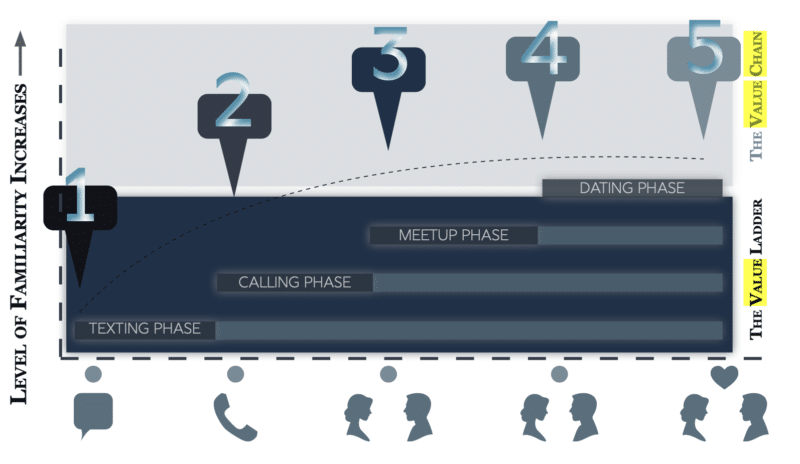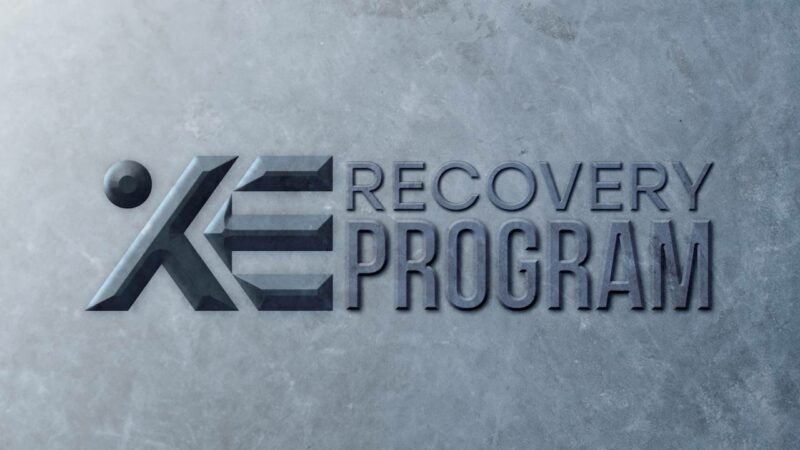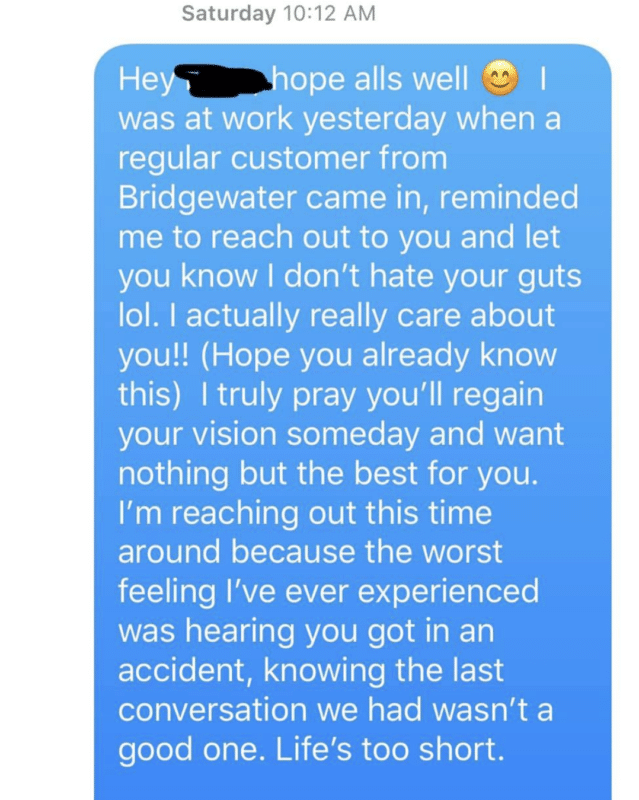Today we’re going to be talking about what to text an ex who hates you or dislikes you.
Basically, you ended on very contentious terms and you’re trying to figure out how you can kind of bridge the gap and get a conversation started.
Now, one thing that we’re going to talk about today in this podcast episode is the fact that we may have finally found a way to do just that, and we’ve been looking for a very, very long time.
But first things first, if you haven’t already, make sure you stop everything you’re doing and take the Ex Recovery Chances Quiz that we have on our website here.
All you have to do if you want to take this quiz is simply click the prompt below. It’s free. It should only take you two minutes.
And by the end you should have pretty much a good idea on whether or not you should be trying to get your ex back or not, or simply be moving on in your particular circumstance.

What Are Your Chances of Getting Your Ex Girlfriend Back?
Take the quizWhat Do I Talk About With An Ex Who Hates Me?
So let’s talk about ex’s who really dislike you and you’re having trouble with texting them or starting a conversation with them.
So, always we’ve talked throughout the years … So I’ve been doing this for maybe, almost nine years now, which is a pretty long time because I feel like it’s just yesterday since I started this entire business up.
But my theory from the get-go has still proven to be the most effective one that we found, and that’s simply when you are going through a breakup and you determine that you want to get your ex back, the number one thing you should do, the theory that we have is to find a way to start a conversation with them, build value and move up the value ladder and the value chain.
So what are the value ladder and the value chains?
Well, basically the value ladder and value chains is this concept that I created to show you how different mediums occur in relationships, where you’re talking to them through text message, talking to them over the phone, talking to them in person and what you should be doing during those events.
And also the different types of conversations you need to be having with them during those type of mediums of conversations that you’ve been having.
I know it’s a little bit complicated, but if you actually go to our website, I’m going to put sort of a picture that sort of defines what this looks like visually and that should sort of clear it up. And if you’re wondering what our results have been, for the most part they’ve been pretty overwhelmingly positive, but we’ve always had one fly in the ointment, and that is contentious situations.
Now, we all know that when you go through a breakup emotions are bound to run high.
And usually when emotions bound to run high, you’re going to say things that you don’t mean, your ex is going to say things you don’t mean.
And of course when you say these things you’ll think you mean them, and when they see those things they’ll think they mean them. And of course, with the barriers of communication being what they are, it just leaves an icky feeling. Eh. But what’s interesting is, we view ex-girlfriend recovery not as a one size fits all situation, but as an organic process that’s constantly ever evolving. And that’s something and sometimes really hard for people to wrap their minds around.
See, a lot of people think that I have all the answers to their problems, that because I’ve created Ex-Girlfriend Recovery and seem to know what I’m talking about, that I know every single situation in the history of man and how to handle it.
And the truth is, I don’t. I know a lot of situations and how to handle them to give you the best chances of success, but even in circumstances where you do everything right you can still fail. And that’s a really hard pill for a lot of people to swallow, but it’s just simply the truth. And I’m not in the business of disguising the truth. The truth is that you can do everything right and still fail.
But there’s always been one really contentious issue that we’ve had, and that’s with issues where you and your ex are constantly fighting, you left on bad terms. How do you handle that? And for years we didn’t really recommend anything different for people who are in situations where … And let’s kind of structure it in levels. Let’s say level one is like you just get into a little petty disagreement and you breakup.

What Are Your Chances of Getting Your Ex Girlfriend Back?
Take the quizLevel 10 is like you’re throwing things at the other person, and they’re throwing things back at you and it’s just really bad. Right?
How To Handle Extremely Contentious Situations
What is the best way to handle those contentious situations? And after eight, nine years of doing this, we think we finally found a way to diffuse those contentious situations.
And the whole reason I’m recording this podcast, is because today in my private Facebook support group there was someone who went off script, and usually those people don’t fare too well. But in this particular case it was a woman, so it’s not exactly, for those of you who are men listening to this podcast, it’s not exactly a perfect fit to your situation, but I think the tactic and the technique still applies.
And that is, she used a strategy. She went off script. She used a strategy that we don’t recommend because we haven’t tested it out enough, but I’ve been reading a lot about it called labeling.
So let me set up the environment for you.
So there’s a girl in our private Facebook group, she purchased my program, the Ex-Boyfriend Recovery Program. Also, if you don’t know, I own a website also called Ex-Boyfriend Recovery in tandem with Ex-Girlfriend Recovery, and as you can guess, it helps women try to get ex’s back, and Ex-Girlfriend Recovery helps men trying to get ex’s back. I know, very original.
But anyway, she’s in the program, and you get access when you buy any of our programs to a private Facebook support group.
And she said she did a no contact rule. She did 45 days no contact rule.
This has been her third breakup. And she decided not to take our advised text messages, but to kind of do her own version of one. And I’m actually going to pull the text message up so that I can read it to you because I think it’s really interesting.
Okay. So, here is her text message word for word.
“Hey, hope all’s well, happy face. I was at work yesterday when a regular customer from Bridgewater came in. Reminded me to reach out to you and let you know I don’t hate your guts, laugh out loud. Hope you already know that. I truly pray that you’ll regain your blah, blah, blah,” and it just kind of goes on from there.
I basically said the important part that you needed to hear. So what’s interesting is the reason this text message stuck out to me … And by the way, she got a response and it was a really, really good response.
But the reason this text message stuck out to me is because I’ve been researching a concept.
I’ve been reading a book called Never Split the Difference. It’s by Chris Voss, he was the FBI’s lead international hostage negotiator.
So this guy was literally sent to hostage situations and forced to diffuse them.
And one thing he talks about in the book is the fact that you’re a failure if just one person loses their life.
So it’s kind of an all or nothing deal if you’re a hostage negotiator. And I figured, well, what a perfect thing to use for breakups, because many of my clients kind of put themselves in these all or nothing situations where they’re heartbroken if things don’t work out. And so, what is it that this FBI hostage negotiator’s doing to get people whose lives are literally on the line to actually pay attention and do what he wants?
And what’s interesting is I read in the book, and just some of the things that he was talking about there is mind blowing, and he kind of equates our lives to negotiation and how every little act we take part of is a negotiation in its own right. And he has all these different rules and regulations for what works in different styles of negotiating.
And one of the things that I really kind of gravitated towards or really resonated with, because I thought to myself, wow, I think that could work for my clients, is this concept of labeling.
Understanding The Concept Of Labeling
So what is labeling?

What Are Your Chances of Getting Your Ex Girlfriend Back?
Take the quizWell, labeling is basically a way of validating someone’s emotion simply just by acknowledging it.
So you give someone’s emotion a name and you show that you identify with how that person feels. And also gets you close to someone without asking about the external factors that you don’t really know anything about. So what good negotiators do when labeling is they address those underlying emotions, they label negatives, they diffuse them.
So basically by labeling negative emotions that the person probably has, you diffuse them, or it can diffuse them. And then of course you have the flip side, labeling positive emotions reinforces them.
So this is really interesting concept, because if you actually just look at that text message that I just talked about, there’s two things happening there.
Number one is she didn’t even realize it, but she labeled her ex’s emotions. So they ended very contentiously, right?
There was a lot of arguments back and forth to the point where she was saying things that she didn’t really mean, and she labeled that emotion. So I’m going to read it back to you and you tell me where you see the labeling occurring, or rather I’ll just stop and tell you. “Hey, hope all is well. I was at work yesterday when a regular customer from Bridgewater came in.
It reminded me to reach out to you and let you know I don’t hate your guts. I actually really care about you. Hope you already know this.”
There’s a label right there.
So she’s making an assumption about her ex. She’s thinking her ex probably thinks about her, that she hates him. And by putting that on the table, she’s kind of diffusing the situation and calming the environment down so that they can actually have a conversation.
Now generally speaking, Chris Voss in Never Split the Difference, he’ll talk a lot about this concept of labeling them by using the following phrases, it seems like or it looks like. So a great example, this is something that happens with my daughter a lot. She’ll get really frustrated, she’ll be playing blocks, for example, and she’s stacking blocks on top of each other. And as inevitably happens, the blocks get bigger, and bigger, and taller, and taller and taller, it becomes harder for the blocks to stay on and eventually it will fall. And when it falls, she’ll freak out. She’ll go, ahhh. She’ll scream.
But the best thing you can do is not scream back at her, is to label her emotion. Is to say, “hey, wow, it looks like you’re really upset because the blocks fell down. Let me show you how you can do it so it won’t fall down next time.” It calms her right down because you’re showing that you understand their point of view.
And this is particularly useful in contentious scenarios. So let’s use a pretend situation. A pretend situation is, let’s say you are trying to get your ex-girlfriend back and your ex-girlfriend does not like you. In fact, she says, I really hate you. So a really great way to diffuse that, because she’s thinking about the awkwardness of that statement as well.
So let’s say you just normally use the original strategy we have, which is reaching out and trying to be witty and trying to start up a conversation. There’s still this awkwardness in the back of their mind.
This can even apply to no contact rule as well. Sometimes people get so worked up over the fact that they’re doing a no contact rule because their ex is going to get mad at them. Right? And so, they reach out to their ex and their ex is like, whoa, whoa, what the heck? You just ignored me for like 30 days. What the heck? So one of the best ways to diffuse situations like this is by labeling the situation or emotion that the ex is likely to have. So let’s use the extreme case where your ex says they dislike you or hate you.
Basically, you do an inverse of what I just read to you in the text message in our Facebook group. So where she says something along the lines of, “Hey, I wanted to let you know I don’t hate your guts, laugh out loud. I actually really care about you.” You can say, “well, I know you hate my guts and you don’t care about me, laugh out loud, but blah, blah, blah.”
By doing that, it kind of puts it out on the table, it diffuses whatever aggravation so that you know you’re both operating under the same rules, and you can just kind of get into having a conversation that you want to have. Now, there’s another element that sort of works here in favor of this, because it can be extremely awkward, especially in text messages, if you just sort of start a text message out like that without camouflaging it.
The Importance Of Camouflaging Your Labels
Camouflage, I can’t give credit to this. This is actually one of my friends who came up with this concept when we were kind of game planning it back and forth. And he was talking about this need for camouflage where you label someone’s emotion. It can be a little awkward to that person and to you to label an emotion, something as strong as like an ex hating you.
So you should do what this person whose text message I’m reading did, she camouflaged it as a joke. So here, let me read it to you again. “Hey, hope all is well.” That’s not a camouflage. “I was at work yesterday when a regular customer from Bridgewater came in here,” this is the camouflage, “reminded me to reach out to you and let you know I don’t hate your guts, laugh out loud. I actually really care about you.” She turned it into a joke. So basically someone from her job came in from a town that her ex is from, which of course reminded her to reach out to him and let him know that she doesn’t hate him, laugh out loud. That LOL is really important there, because it shows that she’s not taking it too seriously and he shouldn’t either. You should do this. This is a way of camouflaging and kind of getting your labeling attempt to blend into the text message.
So, let me do a quick recap before we end this podcast, because this is a really advanced technique that I’m sure a lot of people are going to go crazy with, without even knowing how to do it properly. The first thing is you should really only do this in situations where you know for a fact there’s a contentious issue at the forefront. This is where maybe you’ve done a no contact rule and your ex gets really angry about the fact that you’ve done a no contact rule on them. This is also where maybe you guys ended on really horrible terms where your ex-girlfriend said some really mean things to you. This can also be a case where you said something really mean your ex, like this particular person did right here.
So once you do that, once you identify or think like, hey, I’m in a situation where I think this could work, next you need to understand how to label the behavior or the emotion. So label it. Figure out exactly what it is that’s the stressor of the issue. And then once you figure out the stressor, you must find a way to camouflage it so that it sounds kind of not necessarily like a joke, but kind of like you’re not making it as big a deal as it seems. This will ease the tension and lower their guard to the point where they may engage you in a conversation. Now, this is something that we have not tested, it’s just an idea that we saw one of our clients implement in the Facebook group without any sort of prompting from myself, and it seemed to work positively.
With that being said, it’s a bit of a wild card at this point because we don’t know, we haven’t tested it across the masses yet. But my gut tells me that it’s an extremely effective approach, especially if you’re looking to find a way to ease yourself into a conversation with your ex.












